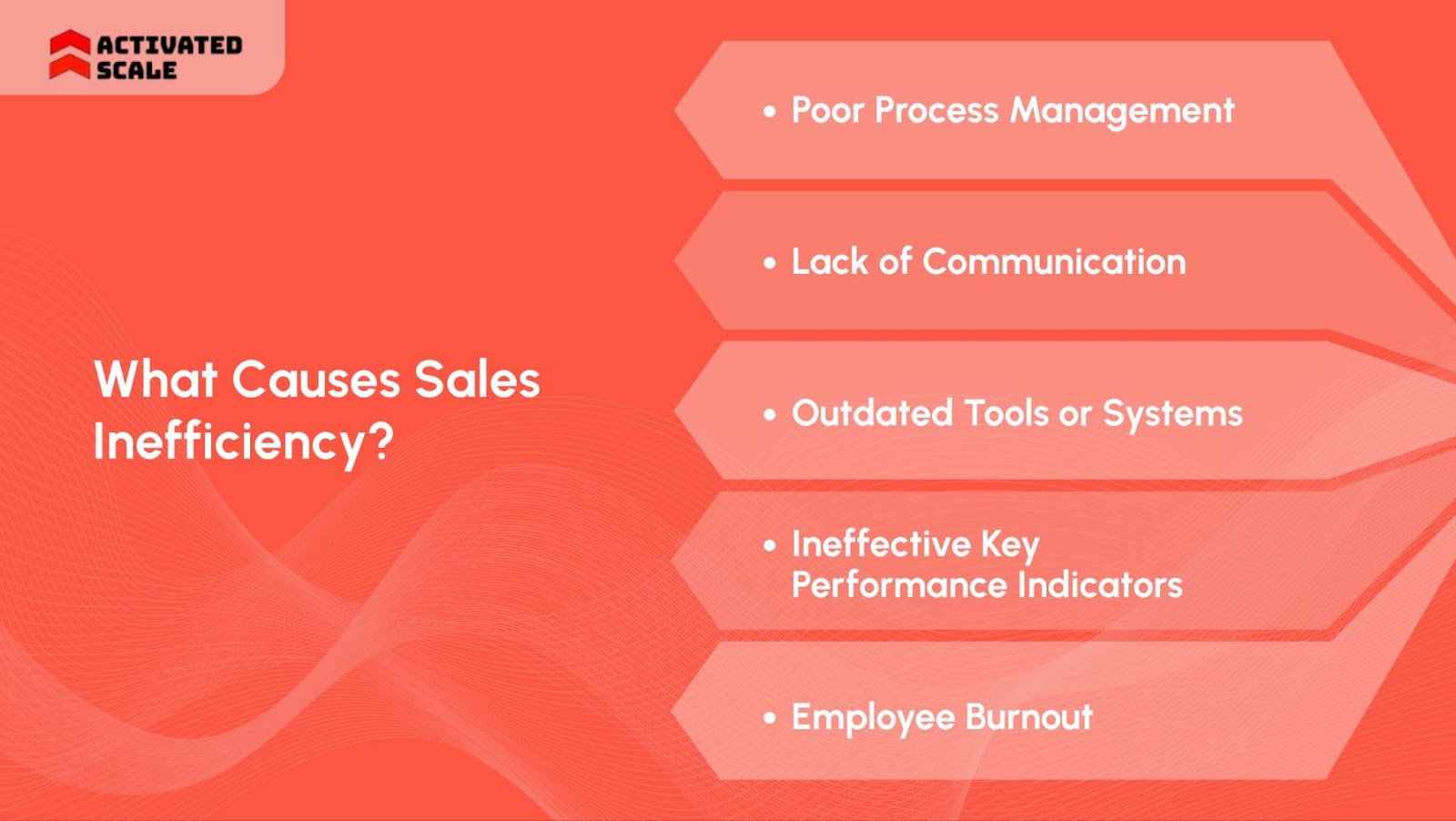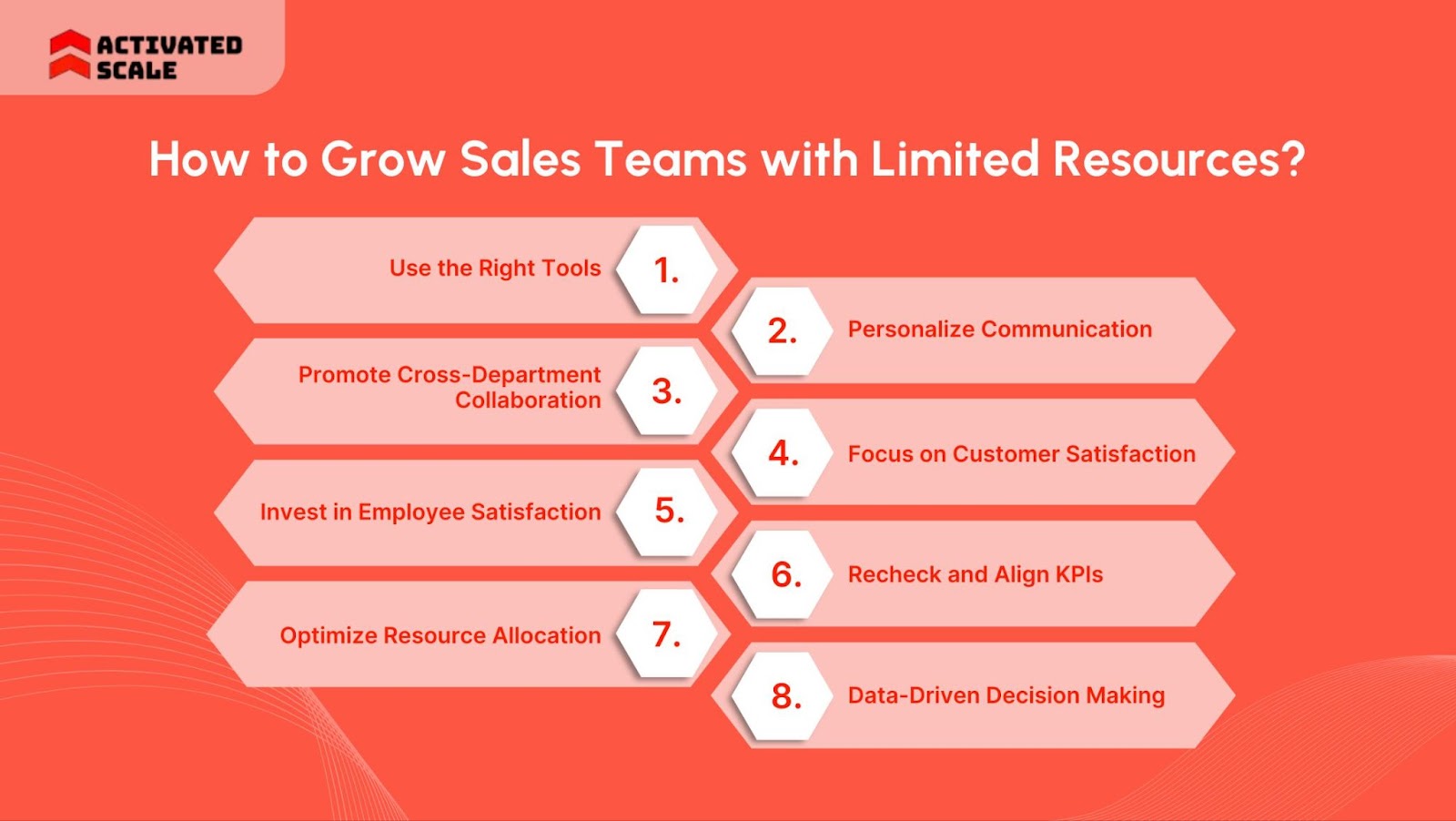"How are we going to hit our sales targets this quarter? We don’t have enough people or resources to scale effectively."
It’s a conversation many sales leaders have had while feeling stuck between ambitious goals and limited resources. When the sales team is small or your budget is stretched, how do you grow and succeed without compromising results?
That’s the exact challenge faced by countless businesses today. 53% of salespeople have admitted that sales have become more difficult than before. We understand the struggle.
That’s why we’re here to share strategies that can help your team perform at its best without needing more headcount. In this blog, we’re addressing how to grow sales teams with limited resources.
Key Takeaways
- Using tools like HubSpot or Salesforce helps organize sales tasks, letting your team focus on what matters.
- Personalizing communication improves engagement and conversion. Tools like Mailshake can automate and scale personalized outreach.
- Happy employees perform better. The 15Five tool helps keep your team engaged and motivated.
- Data is your best friend. Platforms like Google Data Studio help you track performance and adjust strategies in real-time.
What Causes Sales Inefficiency?

It’s important to first understand what typically leads to inefficiency in sales operations. Sales teams can face several challenges that slow down performance, especially when resources are stretched thin. A few reasons that can cause sales inefficiencies are:
1. Poor Process Management
Many sales teams work without organized processes, leading to wasted time on redundant tasks. Without clear workflows, your team may struggle with inefficiencies that prevent them from closing deals faster.
2. Lack of Communication
Sales teams often operate in silos, without regular communication with other departments like marketing or product teams. This can lead to missed opportunities and wasted efforts, as team members aren’t aligned.
3. Outdated Tools or Systems
Using outdated customer relationship management (CRM) tools or ineffective communication platforms makes day-to-day tasks unnecessarily complicated. Not having the right software in place can reduce a team's ability to respond to customers promptly and track important data effectively.
4. Ineffective Key Performance Indicators (KPIs)
When key performance indicators (KPIs) are not aligned with the company’s overall goals, it becomes difficult to measure success accurately. Misaligned metrics can lead to confusion about what really drives sales performance and can ultimately hurt motivation.
5. Employee Burnout
In environments with limited resources, employees may be stretched too thin. This often leads to burnout, disengagement, and lower productivity, which can severely impact sales results.
By addressing these inefficiencies head-on, you can improve your sales team’s ability to hit targets. The following strategies will help you tackle these issues and turn them into growth opportunities.
Read Also: Understanding and Optimizing Conversion Funnel Marketing
How to Grow Sales Teams with Limited Resources?

Growing a sales team with limited resources can feel like an uphill battle. To help you with this, here are eight practical strategies even when resources are tight:
1. Use the Right Tools
The Problem: Sales teams often waste valuable time on repetitive tasks that could easily be automated. In fact, 70% of sales reps feel overwhelmed by the number of tools they are supposed to use. Without the right tools, these inefficiencies only add up.
The Solution: Implementing the right tools can save time, reduce errors, and improve overall sales performance. CRMs like HubSpot or Salesforce can centralize customer data, automate follow-ups, and track leads.
It allows your sales team to focus on closing deals, not data entry.
Tools like PandaDoc help automate document workflows. Another platform, Zapier, organizes manual processes by connecting your apps.
2. Personalize Communication
The Problem: Generic outreach doesn’t resonate with today’s buyers. If your messages feel like they could be sent to anyone, they probably won’t generate results. It can also decrease customer acquisition cost by 28%.
The Solution: Take the time to personalize each interaction with leads and customers. Customizing emails, calls, and messages based on the previous interactions can increase engagement.
Sales enablement tools like Mailshake and Reply.io help automate personalized outreach, so you don’t sacrifice quality for speed.
3. Promote Cross-Department Collaboration
The Problem: 60% of the sales team failed to perform up to expectations due to poor collaboration.
The Solution: Encourage regular communication and collaboration across departments. Sales should work closely with marketing to align messaging and content. On the other hand, customer service can provide insights into customer pain points that can help close deals faster.
Tools like Slack or Asana can keep everyone aligned and provide real-time updates on projects and customer needs.
4. Focus on Customer Satisfaction
The Problem: Sales teams may focus too much on acquiring new customers, neglecting the ones they already have. This leads to churn and missed upselling opportunities.
The Solution: 86% of customers are ready to pay more for a better customer experience. That's why customer satisfaction should be at the heart of your sales strategy. Prioritize delivering value at every touchpoint, from the first interaction to post-sale support.
Use tools like Zendesk or SurveyMonkey to gather feedback and continuously improve the customer experience. Happy customers are more likely to recommend your service and purchase additional products.
5. Invest in Employee Satisfaction
The Problem: Sales teams often work under pressure, which can lead to burnout for 66% of American employees. Disengaged employees may lack the energy or focus to close deals effectively.
The Solution: Creating a supportive and motivating work environment is crucial. Regularly check in with your team, offer recognition for hard work, and provide opportunities for professional growth.
Tools like 15Five for employee engagement surveys help in this case. Bonusly for team recognition can help promote a positive workplace culture.
Is your team struggling with low engagement? Activated Scale’s Contract-to-Hire Sales Recruiting can ensure they’re the right fit for your team before committing full-time.
6. Recheck and Align KPIs
The Problem: Sales teams often struggle because their KPIs don’t align with the company’s overall goals. It leads to confusion about what truly drives success.
The Solution: Revisit your KPIs and ensure they directly reflect your business objectives. Focus on metrics that matter, such as customer acquisition cost, customer lifetime value, and sales conversion rate.
Salesforce and other CRM platforms allow you to customize KPIs and track them effectively. So your team knows exactly what to focus on.
7. Prioritize Resource Allocation
The Problem: With limited resources, it can be tempting to spread efforts too thin across too many initiatives. This obviously leads to wasted time and energy.
The Solution: Focus your efforts on the areas that provide the highest return on investment. This could mean dedicating more resources to high-value leads or educational content that increases efficiency.
Trello or Monday.com can help visually track and prioritize your resources and sales goals.
Maximizing resource allocation is crucial for optimizing sales team performance. With Activated Scale’s Fractional Sales Leadership, you can refine sales playbooks and ensure your resources are effectively allocated.
8. Use Data Analytics to Drive Decisions
The Problem: Sales teams often rely on outdated methods to make decisions, rather than using data to inform their strategy.
The Solution: Data is one of your greatest assets. Use tools like Google Data Studio or Tableau to analyze customer behavior, sales trends, and campaign performance.
This data can guide your sales strategy and ensure that your team is making informed decisions.
Implementing the strategies can go a long way in maximizing your sales team's potential. However, as you scale, you may realize that certain gaps remain. That's where Activated Scale can step in to provide the additional support you need to take these strategies from good to great.
Read Also: Building a Powerful Founder-Led Sales Strategy
How does the Activated Scale Help?
At Activated Scale, we specialize in offering services without the need for heavy investment or resource allocation. Here are three ways we can support your sales team:
- Contract-to-Hire Sales Recruiting: Hiring the right sales talent is critical, but making the wrong hire can be costly. This service reduces the risks of mis-hires even when resources are tight.
- Fractional Selling: If your sales pipeline is growing but you lack the manpower to scale, it gives you access to experienced sales development representatives (SDRs). This cost-effective model allows you to fill critical gaps in your team while maintaining your budget.
- Fractional Sales Leadership: Building a high-performing sales organization requires expert leadership. This allows you to hire experienced vice presidents (VPs) of sales, who can implement the right tools and processes.
Schedule a demo today to learn how we can support your sales growth.
One Final Thought
Building a successful sales team with limited resources doesn’t mean you have to sacrifice growth or productivity. It’s about making smart, strategic decisions that align with your goals and utilizing available tools and methods efficiently. Every small improvement can drive big results.
However, taking this to the next level often requires outside expertise. Activated Scale can help you scale with services, so that you can outsource sales reps. Our solutions provide the flexibility and support needed to help you.
Ready to build a high-performing team on a budget? Let’s talk and discuss how we can make it happen.
FAQs
1. What are 10 tips to improve your sales performance?
To improve your sales performance, consider the following tips:
- Set clear, measurable goals.
- Understand your customer’s needs.
- Personalize your sales approach.
- Use data to inform decisions.
- Invest in ongoing training.
- Focus on follow-ups and relationship-building.
- Automate repetitive tasks for efficiency.
- Track and analyze performance metrics.
- Strengthen your team’s communication.
- Continuously evaluate and adjust your sales strategies.
2. What are some unique ways to increase sales?
Unique ways to increase sales can include:
- Implementing referral programs to tap into your customer base.
- Offering time-limited discounts or exclusive deals.
- Hosting webinars or events to engage prospects.
- Using social proof by sharing customer testimonials.
- Collaborating with complementary businesses for cross-promotion.
3. What are 5 effective ways to increase sales?
Here are five proven ways:
- Improve your lead qualification process to focus on high-potential prospects.
- Upsell and cross-sell complementary products to existing customers.
- Use social media to generate awareness and engagement.
- Enhance customer service to build trust and loyalty.
- Optimize your website for better conversions and ease of purchase.
4. How can I increase sales quickly?
To increase sales quickly, try:
- Offering limited-time promotions to create urgency.
- Running targeted email campaigns to re-engage past customers.
- Implementing a flash sale or bundle deals.
- Organizing your sales process to close deals faster.
- Use paid ads on platforms like Google or Facebook for immediate visibility.
The Ultimate Guide to Hiring a Salesperson!
Get the step-by-step guide to hiring, onboarding, and ensuring success!
_edi.png)




